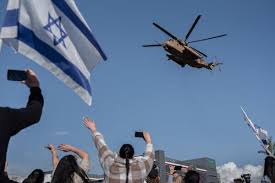Hamas, the militant Palestinian group, made a significant move on Saturday by releasing four female Israeli soldiers who had been held hostage in the Gaza Strip. This gesture marked the second phase of a prisoner exchange deal that had come into effect almost a week prior. In return, Israel released 200 Palestinian prisoners, many of whom were serving life sentences for their involvement in attacks against Israelis.
The release of the prisoners took place as per the terms of the agreement. Buses carrying prisoners departed from Ofer prison in the Israeli-occupied West Bank, and others were released from a facility near Beersheba in southern Israel. However, some of the Palestinian prisoners faced exile under the agreement, with approximately 70 individuals being sent abroad and prohibited from returning to their homes in the West Bank and Jerusalem.
While the swap was a significant step towards good faith negotiations, it was not without its complications. Rear Adm. Daniel Hagari, an Israeli military spokesperson, accused Hamas of breaching the agreement by not first returning an Israeli civilian held captive in Gaza as part of the deal. Arbel Yehud, an Israeli woman, was reportedly supposed to be among those liberated on Saturday.
This latest development occurred amidst ongoing efforts to maintain a ceasefire and negotiate peace agreements in the region. The release of the hostages and prisoners is seen as a positive step towards fostering a more stable and peaceful environment in the Middle East, which has long been fraught with conflict and tension.
The ceremony surrounding the release of the female Israeli soldiers was carefully orchestrated, showcasing Hamas' attempt to assert its power and influence despite Israel's sustained military efforts to combat the group. The release also garnered international attention, with President Trump lauding the development and reaffirming the United States' commitment to supporting Israel in its pursuit of peace and security.
Unfortunately, despite these positive strides, the situation in the region remains fragile. Recent incidents, such as Israeli forces opening fire on displaced individuals in Lebanon and Gaza, highlight the continuing challenges and complexities that persist despite ceasefire agreements and peace talks. Such incidents serve as a stark reminder of the deep-seated tensions and ongoing conflicts that plague the Middle East.
As negotiations and diplomatic efforts continue, the international community watches closely, hoping for further progress towards lasting peace and stability in the region. It is essential for all parties involved to uphold their commitments, respect the terms of agreements, and work towards constructive dialogue to address the root causes of conflict and pave the way for a more peaceful and prosperous future for all those living in the Middle East.


